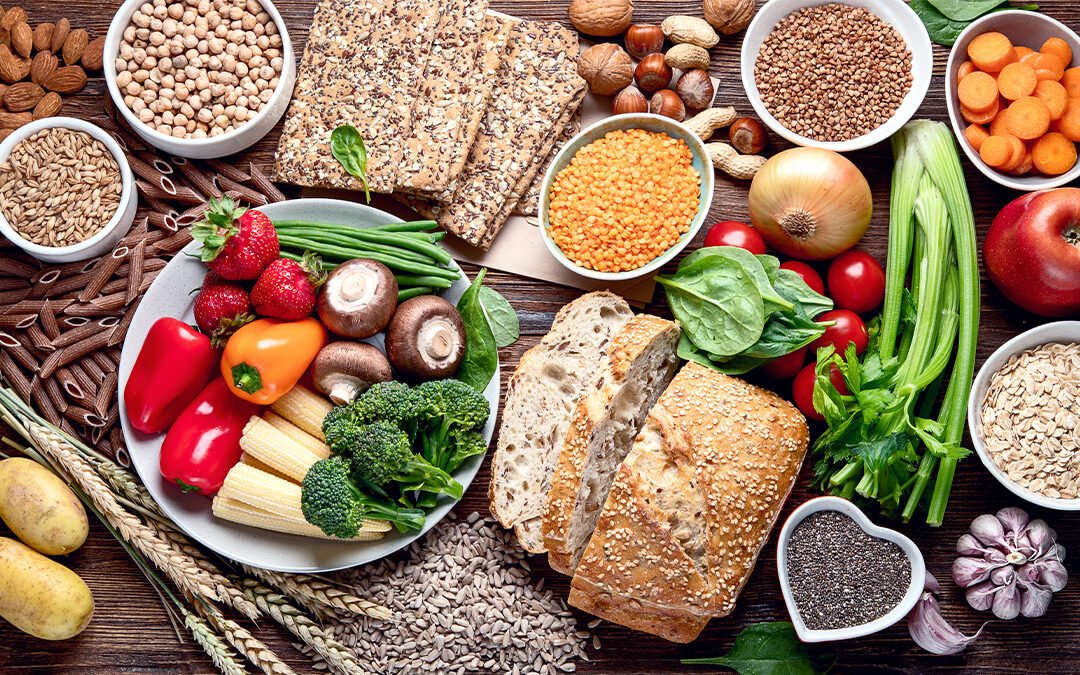You probably already know that fiber is good for your gut, but did you know it can be a major factor when it comes to heart health?
Many Americans have high cholesterol, high blood pressure (hypertension) or both, which are big risk factors for heart disease and stroke. The Centers for Disease Control and Prevention (CDC) estimates that 93 million adults in the U.S. have total cholesterol levels higher than 200 mg/dL (moderately elevated cholesterol) and that nearly 29 million have levels above 240 mg/dL, which is considered high. The CDC also estimates that almost half of the adult population is hypertensive.
Studies show that a diet high in fiber can reduce both cholesterol and blood pressure, significantly reducing the incidence of cardiovascular disease. Yet, most of us are not eating enough fiber. In fact, only 5% of Americans are getting enough fiber. The recommended daily amount for men up to age 50 is 38 grams and 25 grams for women in this age group. Males over age 50 should be getting 30 grams and 21 grams for women over age 50. The average daily fiber amount being eaten by Americans is just 16 grams.
By simply increasing their intake of dietary fiber, many Americans can greatly reduce their risk of cardiovascular disease and stroke, along with a host of other medical conditions such as diabetes, obesity, gastrointestinal disorders and some cancers. With men experiencing greater rates of heart disease than women, it is especially important during Men’s Health Month to highlight the importance of getting enough dietary fiber.
Types of Dietary Fiber
Fiber is a carbohydrate found in plants that your body doesn’t digest. You may have heard it referred to as roughage. There are two types of dietary fiber: soluble and insoluble. Soluble fiber is a type of fiber found in fruits, vegetables, beans, and grains like barley and psyllium. As the name suggests, this type of fiber dissolves in water. Soluble fiber can reduce cholesterol and glucose levels. Insoluble fiber does not dissolve in water, increasing stool bulk and helping keep you regular. Sources of insoluble fiber include whole-grains, beans, nuts and vegetables.
A High-Fiber Diet
Eating a wide variety of high-fiber foods can ensure you get enough of both types of fiber. Be sure to include plenty of:
- Fruits
- Vegetables
- Whole-grains
- Beans/legumes
- Nuts and seeds
If you’re struggling to get enough fiber into your day, try:
- Adding fruits and vegetables to every meal.
- Switching to whole-grains instead of white bread, pasta and rice.
- Choosing high-fiber cereals with at least 5 grams of fiber per serving.
- Swapping out a few meat meals with beans or adding beans to your dishes.
- Making fruits and nuts your go-to for snacks.
You can also get a fiber boost from adding ground flaxseed or psyllium to foods you already eat like smoothies, cereals and salads. Fiber supplements like Metamucil® can also help, but getting your fiber from whole-foods is best if you can.
Lastly, make sure you increase your dietary fiber gradually to give your digestive system time to adjust. Significantly increasing your fiber too quickly can result in abdominal cramping, bloating, gas, constipation and diarrhea.
Other Benefits of a High-Fiber Diet
It’s not just your risk for major diseases that decreases with a high-fiber diet. A diet rich in dietary fiber can also help maintain bowel health and keep you regular, control blood sugar, help weight loss and weight management, and even help you live longer! Research shows that the risk of total all-cause mortality dropped 16% in people with the highest fiber intakes compared to those with the lowest.
Take charge of your health today! If you need help creating a heart-healthy lifestyle or if you have concerns about your heart health, our experienced cardiologists are here to help.
The team at Advanced Cardiovascular Specialists consists of North Louisiana’s leading experts in cardiovascular care. For more information or to schedule an appointment, please call our office at (318) 798-9400.

